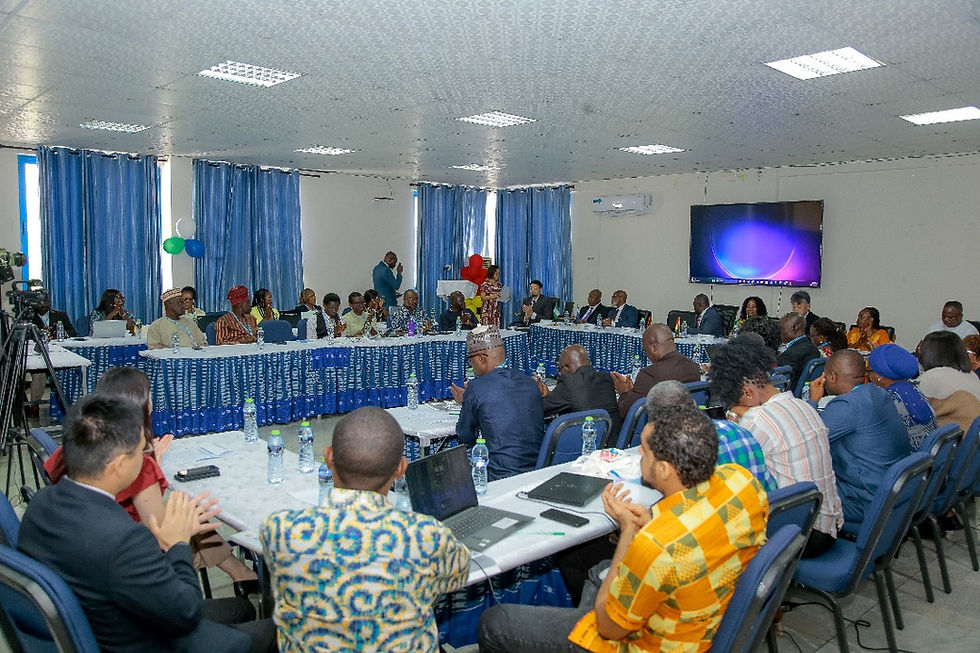Ghana to achieve 100% health insurance coverage at primary health care level by 2030-Health Ministry
- Think News Online
- Dec 12, 2023
- 2 min read

The Ministry of Health has revealed that Ghana is seeking to achieve 100% health insurance coverage at the primary health care level by 2030.
The Ministry hinted that this can be achieved through the implementation of the Universal Health Coverage (UHC) roadmap.
Reading a speech on behalf of the Minister of Health at the International Universal Health Coverage day commemoration held in Accra today, Deputy Minister for Health, Tina Naa Ayele Mensah said "According to the 2021 Holistic Assessment Report of the MOH, the proportion of the population with active NHIS membership stood at 16.8 million (57.3%)"
"In the spiit of leaving no one behind, we are determined not to only increase NHIS coverage for residents in Ghana, but to also extend it to cover non-resident visitorsa who travel to our county fior business, tourism, pleasure and other interests"
She added that government ha taken a bold step to actualise this by developing a draft National Non-Resident Visitors Health Insurance Policy to provide the framework for delivering a National Non-Resident Visitors Health Insurance Scheme for non-residents.
"Ladies and gentleman, in addition to our continued commitment to increase investment in the National Health insurance Scheme, we have in close collaboration with the National Health Insurance Authority, our other Agencies ab parters developed a comprehensive Essential Health Service Package (EHSP) in line with the life-coirse approach"
"We are also re-organizing service delivery at the primary healthcare level through the implementation of the 'Network of Practice Model'
Delivering a speech on behalf of WHO Country Representative to Ghana, Prof. Francis Kasolo, Program Officer for Malaria and Neglected Tropical Diseases, Dr. Felicia Owusu-Antwi said "In general, the report indicates that the expasion of health service coverage has largely stalled since in te recent years, and financial protection for those who fo receive health services has worsened"
"Based on the most up-to-date data, this report shows that as of 2021, about half the world’s population- 4.5 billion people - were not covered by essential health services and in 2019 about two billion people experienced financial hardship due-to-out-of-pocket spending on health, including 344 million people living in extreme poverty"
She added that the primary health care approach remains the premier approach o addressing health and wellbeing challenges.
Dr. Felicia Owusu-Antwi hinted that the health sector needs to establish a clear list of interventions that the citizens of the country will and should be able to access without facing financial challenges.
On his part, National Chairman, Ghana Coalition of NGOs in Health, Bright Amissah-Nyarko said "Hon. Minister, progress in achieving UHC ensuing that everyone, everywhere can access the full range of health services they need without financial hardship is very challenging"
"According to the Tracking Universal Health Coverage: 2023 Global Monitoring Report, more than half o the world's population of 4.5 billion people are unable to access affordable and quality care when they need it"
"2 billion people face financial hardship, including impoverishing health spending for 1.3 billion people due to out-of-pocket spending on health"
He advised government to start making a bette long-term plans on how its aid spending in the health sector can create better outcomes for maternal and new-born child health, disease control and elimination an largely reduce preventable morbidities and mortalities.
Story by: Joshua Kwabena Smith








Comments